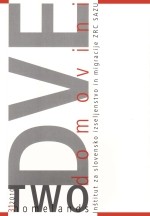Burekmeanings of Burekgiving to Nonburekpeople
Keywords:
burek, material culture, meanings, gift / commodity, giving, immigrants, SloveniaAbstract
There are two economic-anthropological burekenvironments in Slovenia today: the burekmarket, on which burekgoods are bought and sold, and a burekenvironment which eschews the market. The latter is dominated by the homemade burek, most often in immigrant families, where it is also a frequent subject of expressions of hospitality and gift-giving, occasionally even outside the ethnic group. This “burekgiving to nonburekpeople” also poses some new questions with regard to the understanding of burekmeanings. Burekgiving to nonburekpeople reproduces relations between the two ethnic groups included in the exchange. In these reproductions of the fundamental ethnic relations in Slovenian society the central role is played by the object which is included in the exchange, or more precisely its meanings. Such an understanding of burekmeanings emphasizes their constitutive (active) role, i.e. emphasizes not how people create (burek)meanings, but how (burek)meanings create people.
Downloads
References
Appadurai, Arjun (1992). Introduction: Commodities and the Politics of Value. The Social Life of Things. Commodities in Cultural Perspective (ur. Arjun Appadurai). Cambridge in New York: Cambridge University Press, 3–63.
Aristotel (1994). Nikomahova etika. Ljubljana: Slovenska matica.
Bikić, Jasmina (2004). »Ja sam živi dokaz protiv riječi nemoguče«, Ljiljan, 11. 6. 2004 (http://www.dinomerlin.net/press/index_11_07_04.php).
Brezigar, Sara (2006). Pojavi etnične diskriminacije v javni upravi, vojski in policiji v Republiki Sloveniji. Percepcije slovenske integracijske politike: Uskoško prebivalstvo v Beli krajini, etnična diskriminacija v delovnem okolju, izseljevanje in povratništvo Slovencev: Zaključno poročilo (ur. Miran Komac in Mojca Medvešek). Ljubljana: Inštitut za narodnostna vprašanja, 73–151.
Godelier, Maurice (1996/2006). Uganka daru. Ljubljana: Študentska založba.
Gregory, A. Christoper (1982). Gift and Commodities. London: Academic Press.
Komac, Miran, Mojca Medvešek in Petra Roter (2007). Pa mi vi povejte, kaj sem!!! Študija o etnični raznolikosti v Mestni občini Ljubljana. Ljubljana: Fakulteta za družbene vede.
Kršić, Dejan (2004). Burek [geslo]. Leksikon yu mitologije (ur. Iris Adrić idr.). Zagreb in Beograd: Rende in Postscriptum, 65.
Marcus, George E. in Michael M. J. Fischer (1986). Anthropology as Cultural Critique: An Experimental Moment in the Human Sciences. Chicago in London: University of Chicago Press.
Mauss, Marcel (1923–24/1996). Esej o daru. Esej o daru in drugi spisi. Uvod v delo Marcela Maussa. Ljubljana: ŠKUC in Znanstveni inštitut Filozofske fakultete, 9–157.
Miller, Daniel (1987). Material Culture and Mass Consumption. Oxford in New York: Blackwell.
Miller, Daniel (1994). Artefacts and the Meanig of Things. Companion Encyclopedia of Anthropology (ur. Tim Ingold). London in New York: Routledge, 396–419.
Miller, Daniel (1998). Why some things matter. Material cultures. Why some things matter (ur. Daniel Miller). London: UCL Press, 3–21.
Miller, Daniel (2001). Alienable Gifts and Inalienable Commodities. The Empire of Things. Regimes of Value and Material Culture (ur. Fred R. Myers). Santa Fe: School of American Research Press, 91–115.
Minnich, Robert G. (1993). Darovanje kolin in izražanje identitete v slovenski kmečki družbi. Socialni antropolog o Slovencih: Zbornik socialnoantropoloških besedil. Kanalska dolina: Slovenski raziskovalni inštitut – SLORI; Ljubljana: Amalietti, 53–65.
Mlekuž, Jernej (2008). Burek.si!? Recepti / koncepti. Ljubljana: Studia Humanitatis.
Ohnuki-Tierney, Emiko (1993). Rice as Self. Japanese Identities Through Time. Princeton, N. J: Princeton University Press.
Downloads
Published
How to Cite
Issue
Section
License

This work is licensed under a Creative Commons Attribution-NonCommercial-NoDerivatives 4.0 International License.
Authors guarantee that the work is their own original creation and does not infringe any statutory or common-law copyright or any proprietary right of any third party. In case of claims by third parties, authors commit their self to defend the interests of the publisher, and shall cover any potential costs.
More in: Submission chapter





